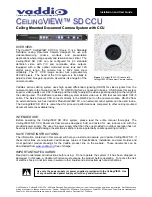
TrackSnap Manual
Model TS-DSC-P41-01
Page 3 of 12
Version
TS P41.2
This document comprises information provided by Suppliers and is
assumed to be correct.
Released
PIR Motion Sensors Basic Overview for Effective Use
All TrackSnap cameras use a PixController PIR motion detection sensor. PIR stands for Pryoelectric Infra-
Red, which detects warm targets in motion over ambient background temperature. A stationary target or a
target not moving can not be detected. The target must also have a warmer surface temperature than the
ambient background temperature in order to be detected.
The size of the target and the distance of the target from the PIR sensor will also effect if the target can be
detected or not. Smaller targets such as birds and small mammals may not be detected especially if they are
moving fast or are at a great distance from the PIR sensor. Larger targets such as medium size and large
size mammals are easily detected within the range of the PIR detection area (see below). However, if you
increase the sensitivity of the PIR sensitivity POT you can detect smaller targets, but you run the risk of a
greater chance of false triggers.
PIR Sensor Detection Area
As ambient background temperatures rise to near 35.5ºC, the difference between the target and ambient
background temperature decreases for warm-blooded targets. The sensitivity of the PIR sensor declines in
this instance. However, as ambient background temperature decrease the opposite is true and the sensor
PIR becomes more sensitive. Under these conditions you can adjust the PIR sensitivity POT to
accommodate your detection range needs. The graphics below show an example of the PIR detection area
at around 20ºC. The PixController PIR sensor is unique in that the target does not need to be moving from
right to left, or left to right. The sensor can detect the target in any vector of travel (say up and down target
movement), which is very important if you plan to mount your camera in an elevated position for security
reasons.
The red area is the PIR detection area in the above graphic.






























